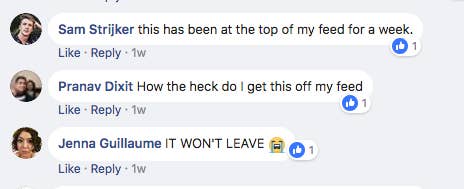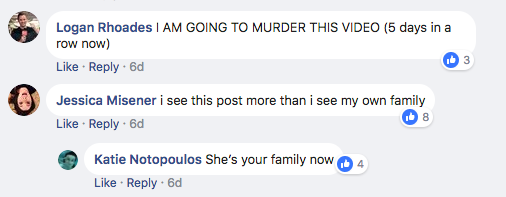
Last Saturday — 12 days ago now — I shared a cringeworthy video on Facebook: a six-minute clip of a twentysomething white woman showing off her small, blandly decorated Brooklyn apartment. Sort of the pumpkin spice latte version of MTV Cribs — innocuous, but annoying. Ever since, this video has been waging a reign of terror over my friends and family, showing up at the top of their feeds every single day, over and over and over. They are complaining to me on Facebook. They are complaining to me in real life. They are tweeting me about it and emailing me. Begging me to remove this cursed video that greets them each time they open Facebook.
And of course, they commented on my post. And then people commented on the comments. The more people commented, the more the video showed up on other people's feeds. As the rage around this post intensified, so did the comments. Coworkers I sit next to commented. College friends commented. Someone I went to preschool with commented. A vicious, algorithmically delicious cycle.
After a few days, the comments shifted from “I hate this woman’s apartment” to “why is this video constantly at the top of Facebook?” or “please, I beg you, delete this video,” and eventually, my boss commenting “please write about this.”

At the start of 2018, Facebook announced it would focus more on meaningful engagement. The company's CEO Mark Zuckerberg has written numerous times that the company is now focusing on “time well spent” on the platform (even though few inside Facebook seem to know how to define that metric). Since then, people who rely on Facebook for eyeballs (like journalists) have been nervously trying to figure out what this change means — is “meaningful engagement” just shorthand for comments? Well, they should just ask me, because I’ve figured it all out. And I’m using this to torture my friends.
Presumably because of this latest algorithm shift, my post stayed at the top of people’s feeds — even though part of the new change was supposed to lead people away from passively consuming content (aka watching videos and scrolling through memes), and what I shared was exactly an example of the kind of passive content Facebook wants you to consume less of. My post still broke through, thanks to its ability to goad my friends into angrily commenting. Facebook is rewarding me for pissing my friends off, and its new thirst for comments seems to have driven itself into a loop that won’t let my friends free from the grasp of a piece of content that they actually hate.
It’s in the moments where the cracks start show — when the same awful video is at the top of your Facebook page for 12 days straight — that we remember how fucked up it is having our friendships ruled by an algorithm.
We’ve come to accept nonchronological feeds in our social media. Even on Instagram, where people do still seem to complain the most about it, we understand the rules of the new feed. It’s in the moments where the cracks start show — when the same awful video is at the top of your Facebook page for 12 days straight — that we remember how fucked up it is having our friendships ruled by an algorithm. It’s like in a sci-fi movie where a sexy android peels off her mask and you remember she’s made of steel, or the Wizard of Oz furiously cranking his noise machine behind the curtain. This algorithm doesn’t understand friendship. It can fake it, but when we see Valentine’s Day posts on Instagram four days later, or when the machines mistake a tornado of angry comments for "engagement," it’s a reminder that the machines still don't really get the basics of humanity.
I’ve been down this path before. In fact, I’ve written about this problem before. In the summer of 2016, Facebook did another recalibration of its News Feed that prioritized posts from friends and family over publishers, ending what seemed to many like a three-year tyranny of BuzzFeed quizzes and cooking videos. Soon after, I noticed a post from a coworker, asking if anyone had ever tried making overnight oats, had “stuck” to the top of my Facebook feed for five days straight, even though I had never commented or liked the post. I dubbed this phenomenon the overnight oats problem.
At the time, I saw this shift toward posts from friends and family a little uncanny. Back then, people had been so used to communicating purely through shared content from publishers that people had forgotten to ever actually do a simple text post. This meant that text posts were rare, and when someone actually wrote one — like asking about oatmeal recipes — Facebook’s algorithm got a massive boner for it. In general, it felt like Facebook was an alien who came down to Earth and thought “friendship” meant caring about Minions memes from someone you sort of knew in middle school.
Facebook was an alien who came down to Earth and thought “friendship” meant caring about Minions memes from someone you sort of knew in middle school.
Since that shift, we’ve gotten more used to posting text posts again, in large part due to the popularity of those colorful text blocks, which started out annoying, but now you’re just used to them. That recommendation widget thing is even kind of useful now, and you maybe even forgot that it was weird when you first started seeing it.
A lot more has changed with Facebook since summer 2016 — between fake news and having to answer to Congress about Russian election meddling on the platform, it's been a rough year and a half for the company. This latest algorithm change toward "meaningful engagement" seems like an obvious response to the crisis it found itself in by the end of 2017.
So here we are, at a new phase in Facebook’s history, when comments are king. But this has led to a new version of the overnight oats problem: People are being served the same stale content from a friend for 12 days straight, just because it happens to have a lot of comments. No one wanted to see my post several times a day, but the algorithm had, once again, misjudged what people wanted. In fact, people really hated this video — they wanted it to go away. Facebook took their pleas for it to stop as a sign that they should be shown it more and more. It’s enough to almost make you nostalgic for those Russian chaos agents.

You can try this yourself; it’s easy to game the system by posting something that drives comments. Try asking a question, or for advice: “Does anyone have a shampoo they love?” or “What was the most embarrassing thing that happened to you in middle school?”
Trust me, you will get lots of replies. And it will stick to the top of your friends’ feeds for days.
And if they are like my friends, they will hate you for it. Good luck.
